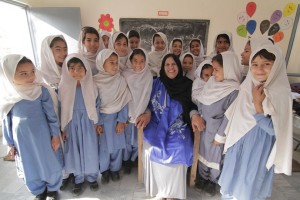Press Release 19 Feb, 2016
ISLAMABAD: Nobel Laureate Malala Yousafzai congratulated Aqeela Asifi, an Afghan refugee teacher for being selected as a top ten finalist for Global Teacher Award.
“I am very happy and pray you win the Global Teacher Award,” said the Nobel Laureate while speaking with Aqeela Asifi on the phone.
She said Aqeela’s commitment as a teacher in the face of adversity to making education accessible to refugee children is amazing. “I am inspired by her selfless dedication to the promotion of education,” she said.
Malala Yousafzai said her struggles demonstrates that a single Afghan refugee can make a difference in the lives of thousands. “
“Empowered refugees can shape society. Education is the best hope for the future generation of Afghan refugees. Education protects, empowers and bring prosperity and peace,” she said.
The Afghan refugee teacher, who teaches children at the Kot Chandana refugee camp, Punjab also won the prestigious 2015 UNHCR Nansen Refugee Award for her extraordinary humanitarian work on behalf of refugees. She has been recognised for her brave and tireless dedication to promoting education for Afghan refugee girls in Pakistan – while herself overcoming the struggles of life in exile.
In an extraordinary story of bravery and determination against all odds, Aqeela Asifi made it her mission over more than 23 years in exile to bring education to refugee girls in a remote community in Pakistan.
The Global Teacher Prize, widely referred to as the Nobel Prize for teaching, was set up to recognize one exceptional teacher who has made an outstanding contribution to the profession as well as to shine a spotlight on the important role teachers play in society. By unearthing thousands of stories of heroes that have transformed young people’s lives, the prize hopes to bring to life the exceptional work of millions of teachers all over the world.
Born to a liberal family in Kabul and educated in Kandahar at the time when education in Afghanistan was free and for all, Aqeela Asifi trained as a teacher but left Afghanistan due to war. When she arrived as a refugee at the Kot Chandana camp in Pakistan there were no operational schools in the local area. Strongly conservative attitudes meant the education of girls was frowned upon and female teachers were unheard of.
Aqeela set up a school in a borrowed tent and worked hard to overcome resistance and negative attitudes. Twenty families agreed to their daughters being educated and Aqeela initially focused on teaching noncontroversial subjects such as personal hygiene, home management skills and religious education. After gaining the trust of the community, Aqeela was able to introduce literacy, Dari language, mathematics, geography and history. There was no money for resources like blackboards so Aqeela stitched pieces of cloth with handwritten text to the tent walls and wrote books by hand at night. Her students traced their first words in dust on the floor.
Today, and owing largely to the support by the Government of Pakistan, there are nine schools in the camp with many female teachers and over 1,500 students including 900 girls. With education, early and forced marriages in the community have declined. Aqeela’s school has produced over 1,000 graduates (mainly Afghan refugee girls, but also local Pakistani children). Some have become doctors, engineers, government officials and teachers in Afghanistan.
Share on Facebook Share on Twitter